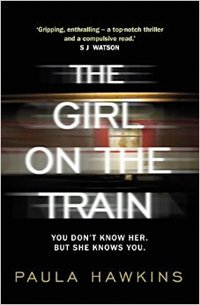
With the publisher calling it ‘the new Gone Girl’, this book is one of the most hotly anticipated crime debuts of early 2015 and it has been impossible to avoid all reviews and buzz before reading it. Does it deserve all the hype? Well, yes and no.
Our main character, Rachel, takes the 8:04 train every morning to commute into London. The train often stops at a signal on the way, not far from the house she used to live in with her ex-husband, but it’s another house and another couple, just a few houses further down, who capture her imagination. She gives them names, Jess and Jason, and imagines a gilded life of creativity, contentment and much love for them. One day, however, she sees something disturbing, something which doesn’t fit in with the image of the perfect couple. Soon after, she discovers that Jess (real name: Megan) has gone missing and tries to inveigle herself into the investigation. The author leaves us to speculate whether Rachel’s motivations are entirely altruistic, or whether they stem from a desperate need to feel important once more. Shunned as an unreliable witness by the police, she tells the confused, abandoned husband Jason (real name: Scott) what she witnessed, with more dramatic and far-reaching consequences than she could have foreseen. When the investigation changes from missing persons to murder, Rachel feels she can trust no one, least of all herself.
The book has many things going for it. It has an intriguing premise that most of us can relate to – who hasn’t peeked into other people’s houses and gardens when stuck on a train? Who hasn’t fantasised a little about other people’s perfect lives, with just a touch of envy and wistfulness? It has a memorable central character, who takes unreliability to a whole new level with her alcoholism, stalkerish behaviour towards her ex and his new wife, as well as frequent memory blackouts. The descriptions of alcoholic guilt and self-justification are bleak but very accurate, right down to small details such as pouring gin into mugs, to make flatmates and office colleagues believe it is tea or coffee. I could not help but warm to Rachel’s pain and helplessness, although my heart sank every time she found another excuse for going to the off-licence. Finally, the novel is written in a very engaging, fast-paced style. Although I guessed the real villain of the piece fairly early on, I found it a compelling read. If you are a fan of domestic noir, you will be fascinated with the twists, human flaws and nastiness which are very recognisable, if somewhat extreme.
All in all, this is a perfecty enjoyable and serviceable psychological thriller, which does what it says on the tin and would make a great TV drama. However, there are some elements which prevent The Girl on the Train from being truly scintillating and standing out in what is becoming a rather crowded field.
First there is the more stereotypical portrayal of the other two female characters – Megan and Anna (new wife of Rachel’s ex). The way they define themselves by their ability to procreate and as appendages to successful men is perhaps necessary for the story, but it does make them seem rather flat and unrelatable. Seeing the world through the their eyes doesn’t give much insight into their characters, although they work as a point of contrast to Rachel’s often misguided views.
The ending descends into conventional thriller territory and gives a sense of déjà vu.
In spite of these reservations, I would certainly recommend this book for its sensitive portrayal of alcohol-fuelled delusion, a very complex main character and a really entertaining read.
Doubleday
Print/Kindle/iBook
£6.02
CFL Rating: 4 Stars










I loved The Girl On The Train becuase it portrays perfectly how even nowadays there are abusive relationships hidden in supposedly ‘normal’ relationships. Rachel held herself accountable for the end of her marriage, but there was a very complex and traditional structure of power behind. So, I recommend this to anyone who is interested in power and perceptions in relationships!
I interviewed Paula here: https://booksandreviews.wordpress.com/2015/01/15/exclusive-interview-with-paula-hawkins-author-of-the-girl-on-the-train/
I love the premise of Girl…Train. If the villain seemed obvious too soon, well, perhaps this reader has a twisted sensibility!
Ha, ha! Yes, I probably do have a suspicious mind. As Elena commented above, there are some interesting observations to be made about ‘societal expectations’ of relationships and what really goes on beyond the facade of normal. I thought the book did that very well.